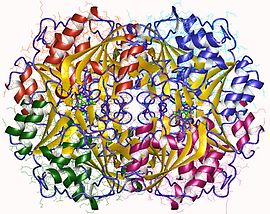Asparaginase
 |
|
| Clinical data | |
|---|---|
| Trade names | Elspar, others |
| AHFS/Drugs.com | Monograph |
| MedlinePlus | a682046 |
| License data |
|
| Pregnancy category |
|
| Routes of administration |
IM or IV |
| ATC code | |
| Legal status | |
| Legal status | |
| Pharmacokinetic data | |
| Biological half-life | 39-49 hours (IM), 8-30 hours (IV) |
| Identifiers | |
|
|
| Synonyms | crisantaspase, colaspase |
| CAS Number | |
| IUPHAR/BPS | |
| DrugBank | |
| ChemSpider |
|
| UNII | |
| KEGG | |
| Chemical and physical data | |
| Formula | C1377H2208N382O442S17 |
| Molar mass | 31731.9 g/mol |
|
|
|
Asparaginase, also known as crisantaspase, is an enzyme that is used as a medication and in food manufacturing. As a medication it is used to treat acute lymphoblastic leukemia (ALL), acute myeloid leukemia (AML), and non-Hodgkin's lymphoma. It is given by injection into a vein, muscle, or under the skin. A pegylated version is also available. In food manufacturing it is used to decrease the acrylamide.
Common side effects when used by injection include allergic reactions, pancreatitis, blood clotting problems, high blood sugar, kidney problems, and liver dysfunction. Use in pregnancy may harm the baby. As a food it is generally recognized as safe. Asparaginase works by breaking down the amino acid known as asparagine without which the cancer cells cannot make DNA.
Asparaginase was approved for medical use in the United States in 1978. It is on the World Health Organization's List of Essential Medicines, the most effective and safe medicines needed in a health system. The wholesale cost in the developing world is about 42.00 USD for per 10,000 iu vial. This amount in the United Kingdom costs the NHS 613.00 pounds. It is often made from Escherichia coli or Erwinia chrysanthemi.
...
Wikipedia
